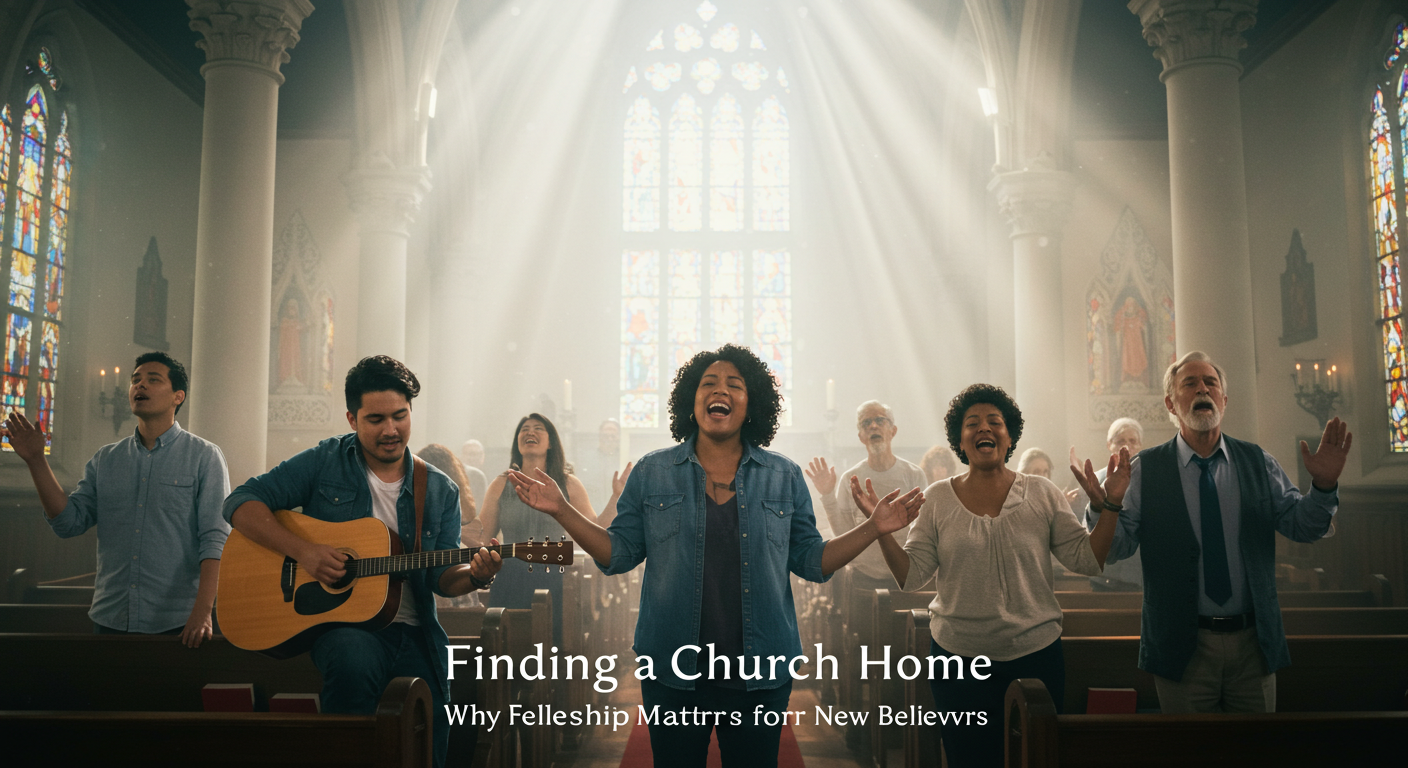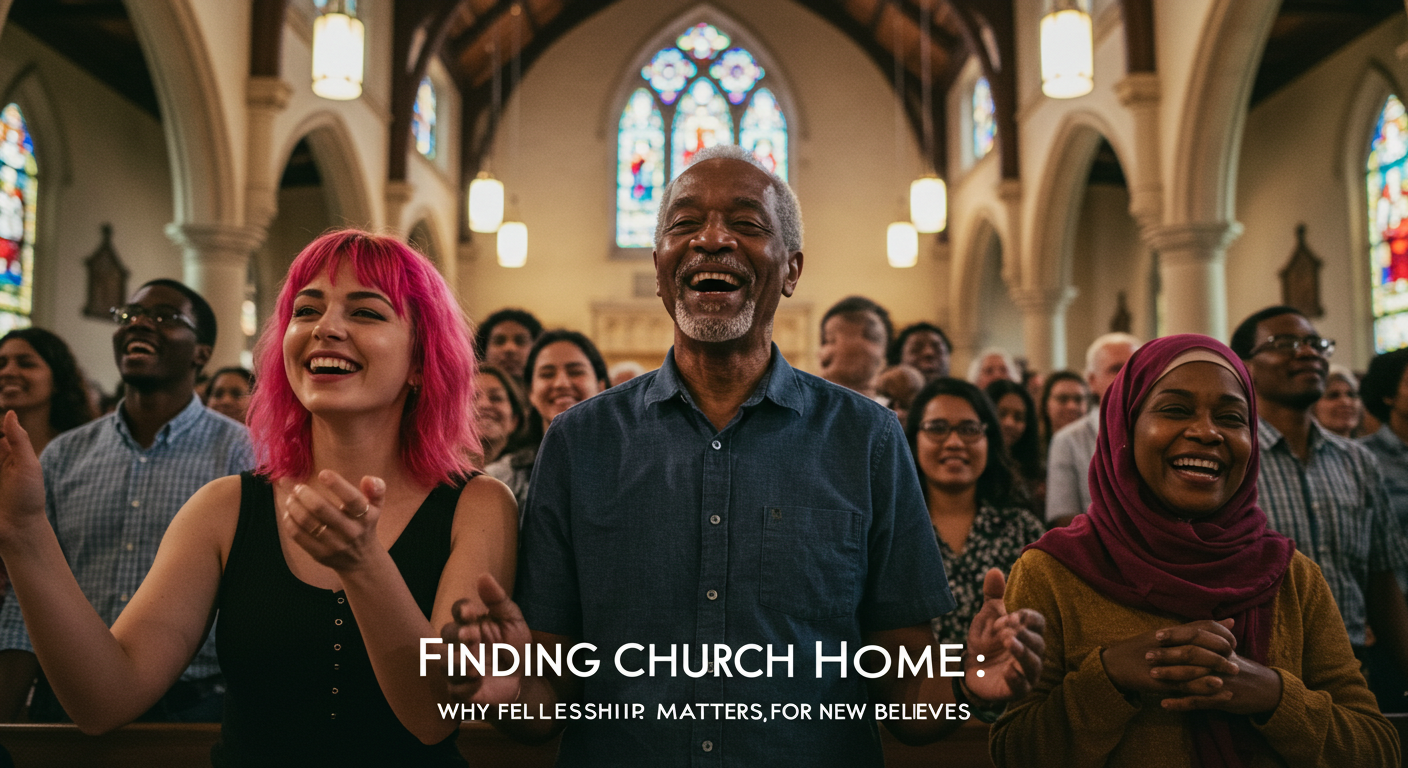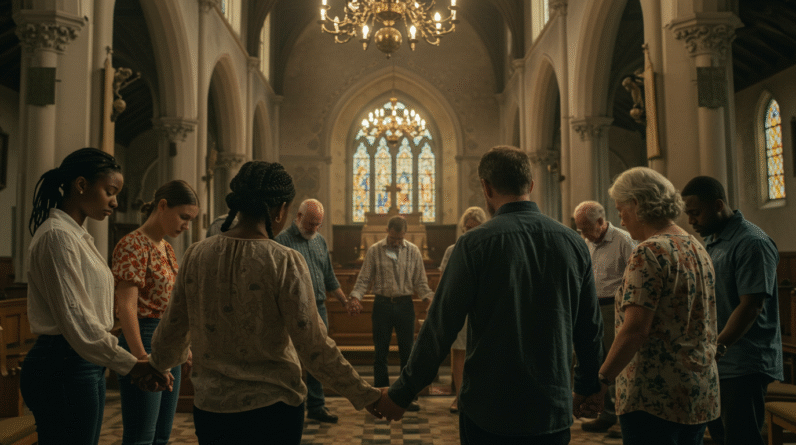Finding A Church Home: Why Fellowship Matters For New Believers
You just said “yes” to Jesus, and everything feels both thrilling and a little overwhelming. You’re learning to pray, you’re reading Scripture, and you’re trying to figure out what it means to live as a follower of Christ. One of the first and most important steps you can take now is to find a local church community. This article is written to walk with you in that step, to help you understand why the church matters, and to give you practical steps to find a loving place to belong. At its heart is a simple truth: Christianity is not a solo journey — God designed you for community. The phrase fellowship for new believers describes exactly what you need now: a relational, spiritual environment that helps you grow.
Why Fellowship Matters
Fellowship is not just a Sunday ritual; it’s a lifeline. When you surround yourself with believers, you create a space where faith is encouraged, questions are welcomed, and spiritual formation happens in everyday life. If you’re new, you need more than information about God; you need relationship with people who can model Christlike living, pray with you, and help you put spiritual truths into practice. Fellowship for new believers acts as the soil where your faith can take root and bear fruit.
The Bible clearly shows that followers of Jesus were never meant to walk alone. The early church met regularly, shared meals, taught one another, and cared for the practical needs of the community. These patterns were not optional extras — they were core to what it meant to be the body of Christ. See how the early church lived this out in Acts 2:42-47.
Fellowship Connects You to the Body of Christ
When you plug into a local church, you’re joining something bigger than yourself. You become part of the body described in Scripture, where each person has a role and each role matters. That connection gives purpose and context for your gifts, struggles, and spiritual development. Fellowship for new believers provides the mutual support and encouragement you need to grow into maturity.
Paul’s metaphor about the church body helps you see why your connection matters. He wrote that the body has many parts, each with a unique function — and when one part hurts, the whole body feels it. For a scripture picture of this, read 1 Corinthians 12:12-27.
How Fellowship Strengthens Faith
Your faith will grow faster and deeper when it is connected to others. Studying Scripture with others helps you see different angles and applications you might miss on your own. Praying together invites God into your relationships and amplifies the power of your petitions. When you watch others live out faith in real life — in work, in parenting, in trials — you gain courage to act on your own faith. Fellowship for new believers accelerates this growth by surrounding you with models, teachers, and prayer partners.
Hebrews encourages believers not to give up meeting together, because that consistent gathering fuels love and good deeds. The author’s concern is that believers might drift away from one another and lose the mutual encouragement that keeps faith alive. For the full context, consider Hebrews 10:24-25.
Worship and Spiritual Formation
Worship in community is formative. When you worship with other Christians, your heart is shaped by truth, song, prayer, and the sacraments in ways your private devotions can’t fully replace. The corporate rhythm of worship helps you catch a vision for God’s glory and your part in it. Regular attendance and participation help nurture spiritual disciplines — reading Scripture, prayer, service — that become the scaffolding of your spiritual life. Fellowship for new believers enables you to adopt these disciplines in the context of relationships.
The Lord promises to be present when believers gather in His name, which gives you confidence that God meets you in community. Jesus said, “For where two or three gather in my name, there am I with them.” Reflect on that promise in Matthew 18:20.
Accountability and Growth
One of the most practical reasons you need a church home is accountability. Growth often stalls when you try to manage your spiritual life privately. People who love you will lovingly challenge you, notice patterns you don’t see, and pray for you in ways that protect you from spiritual danger. Accountability is not about shaming; it’s about helping you become spiritually healthy and whole.
Galatians teaches you to carry each other’s burdens, which is a form of accountability that reflects Christ’s love. That kind of bearing one another’s burdens is a healthy, practical way to grow together. Read Galatians 6:2.
Confession and Restoration
In community you have people who can speak truth into your life with grace and humility. James encourages believers to confess sins to one another so they can be healed and restored. This practice prevents isolation and spiritual secret-keeping, and it invites God’s healing power into your relationships. Fellowship for new believers includes the safe opportunity to be honest, repentant, and restored.
James 5:16 says, “Therefore confess your sins to each other and pray for each other so that you may be healed.” You can explore that passage here: James 5:16.
Belonging and Identity
When you’re new, one of the deepest needs you face is to belong. The church offers you identity rooted not in performance, status, or past mistakes, but in Christ. You are welcomed into a family where your weaknesses are met with grace and your strengths are used to serve others. Knowing that you are part of God’s family reshapes how you see yourself and how you live.
Romans helps you understand that although we are many, together we form one body in Christ. This identity shapes not only how you view yourself, but how you interact with others. See Romans 12:4-5.
Emotional and Practical Support
Your church will be the place where practical needs are met in the name of Jesus: meals after childbirth, financial assistance in crisis, companionship in grief, encouragement through job loss. Belonging means you don’t have to carry your burdens alone. Fellowship for new believers makes the Christian life tangible — someone to call, someone to pray with, someone to drive you to a doctor’s appointment when life hits hard.
The early church modeled this care, sharing possessions and meeting one another’s needs. Acts 2 gives a picture of believers living in loving, practical generosity toward each other. Read more in Acts 2:42-47.

Finding the Right Church Home
Not every church will be the perfect fit for you, and that’s okay. Finding the right church home is like finding a new family — it takes time, prayer, and some trial visits. Look for a church that proclaims the gospel clearly, demonstrates love for people, and equips you to serve. A healthy church will be humble about its imperfections but committed to biblical truth and spiritual growth.
Ask questions about their beliefs, their discipleship programs, and how they care for members. Attend a few services, join a small group, and watch how members relate to each other. Your goal is to find a place where you can be known, love others, and be shaped for mission. Fellowship for new believers should be safe, encouraging, and gospel-centered.
What to Look for in a Church
When you evaluate a church, consider the preaching and teaching — is it centered on Christ and Scripture? Notice how people treat one another; warmth and hospitality matter. See if the church prioritizes discipleship through classes, small groups, and mentoring. These elements matter more than a polished program or a large attendance number.
A church that lives out the gospel will love both truth and grace, address life’s real issues, and invite you into service. Your new church should help you move from being a consumer to being a contributor, growing into your gifts and calling.
How to Engage Once You Find a Church
Finding a church is the first step; engaging is where growth happens. Show up consistently to worship, join a small group, serve in a ministry, and build friendships. Consistency creates trust and allows relationships to deepen. Serving gives you purpose and helps you move from a passive to an active faith.
Be patient with yourself and with others. It takes time to build meaningful relationships. Commit to two or three intentional steps: attend worship, join a group, serve monthly. Fellowship for new believers isn’t a checklist to complete; it’s a lifestyle you step into slowly and faithfully.
Practical Steps to Connect
Take small, practical steps to get connected: introduce yourself to someone after the service, sign up for a newcomer’s class, ask about volunteer opportunities, or attend a newcomers’ lunch. These are simple actions that compound into deeper belonging.
You don’t have to be perfect to be involved. Start where you are, bring your questions, and let community do what it’s meant to — shape you into the likeness of Christ through relationships and shared life.
Overcoming Common Fears
You might worry about judgment, rejection, or making a mess of your new faith. Those fears are normal, but they don’t have to control you. Remember that the church is a place for broken people who are being made whole. People in church have their own struggles, and most are welcoming to newcomers who are humble and honest.
If you’ve had negative church experiences before, allow time for healing. Seek a church that models grace and good leadership. Talk with a pastor or trusted member about your concerns; transparency will build trust and open doors for real fellowship for new believers.
What If You Find Hurt?
If you encounter hurt in a church, address it biblically — seek wise counsel from a mature believer or pastor, pray, and, if necessary, find a healthier congregation. The goal is not to abandon the idea of church, but to find a community that reflects Jesus’ heart. Restoration is possible, and a loving church will help you process pain with grace.
Scripture encourages believers to be peacemakers and to restore with gentleness. When you face conflict, rely on biblical wisdom and prayer. Jesus’ desire is unity, and healthy churches pursue reconciliation diligently.
The Role of Small Groups
Small groups are where most of the real discipleship happens. In a group you’ll study Scripture in a smaller setting, pray for each other, serve together, and build friendships that carry you through life’s ups and downs. Small groups are the practical expression of fellowship for new believers — they provide a safe environment to ask questions, confess struggles, and learn how to apply faith to daily life.
Choose a group that fits your season of life and personality. If you’re young and single, look for singles groups; if you have young children, find a parenting group. The right group will help you grow spiritually and emotionally.
How to Participate Well in a Group
Come prepared, be honest, listen more than you speak at first, and share your gifts. Commitment is essential: show up regularly and invest in others. Groups flourish when members value confidentiality, prayer, and mutual support. Your presence matters; by participating you help create a place where others can grow too.
Remember that vulnerability is a strength. When you open up in a trusted group, you invite others to do the same — and that’s how real transformation happens.
Service as Discipleship
Serving in the church is one of the fastest ways to grow. When you use your gifts to serve others, you learn humility, dependence on God, and the joy of contributing to something eternal. Service moves you from spectator to participant, and it gives you a sense of purpose as you see lives changed through your contribution.
Look for opportunities that match your gifts and schedule. Serving doesn’t have to be glamorous — it’s faithful obedience. Fellowship for new believers often begins in service, as shared tasks create space for relationships to form and deepen.
Where to Start Serving
Begin with something manageable: greet people at the door, help with a kids’ ministry, serve in hospitality, or assist with tech or music if you have those skills. As you serve, you’ll discover other areas where God can use you. Serving also helps you connect with people who have similar passions and builds ministry friendships that last a lifetime.
Let your service flow from gratitude to God for what He has done in your life. When you serve with that heart, it becomes worship.
The Importance of Teaching and Discipleship
A healthy church will teach the Bible clearly and intentionally disciple believers at every stage. Teaching grounds you in doctrine — what you believe — while discipleship helps you live out that belief. Seek a church with a plan for spiritual growth: classes, mentoring relationships, and pathways that move you from new believer to mature disciple.
Discipleship is personalized; it meets you where you are and gently pushes you toward spiritual maturity. Fellowship for new believers should include opportunities for learning, accountability, and practical faith application.
Finding Mentors and Leaders
Look for mature Christians who can mentor you — people who demonstrate a steady walk with Jesus and the fruit of the Spirit. Mentors provide wisdom, perspective, and encouragement. They help you navigate spiritual questions and life choices in a way that is rooted in Scripture and prayer.
Ask your pastor or small-group leader about mentorship opportunities. Many churches have formal programs; some match you informally. Either way, having a spiritual guide accelerates your growth.
Mission and Outreach
Being a member of a church connects you to mission — both locally and globally. As you belong, you participate in sharing the gospel, serving the poor, and using resources to bring hope to a broken world. Your church gives you a platform to live out the Great Commission together with others.
Participating in mission helps you understand that your faith isn’t just about personal benefit — it’s about joining God’s work in the world. Fellowship for new believers becomes outward-focused when the community prioritizes sharing the love of Christ.
How You Can Join the Mission
Get involved in local outreach events, support global missionaries your church partners with, or serve in practical ways that show Jesus’ love to your neighborhood. As you participate, your faith will become more robust, rooted in both truth and action.
Remember, mission is relational. Often the most significant impact comes through consistent acts of love and presence in people’s lives.

The Long-Term Benefits of Church Membership
Membership isn’t a contract; it’s a commitment to grow with a specific community. Long-term involvement in a church leads to deeper friendships, spiritual maturity, and a stronger sense of identity in Christ. Over time you’ll see the fruit of shared life: marriages strengthened, families discipled, and new leaders raised up.
When you commit to a church, you’re investing in something eternal — lives that are transformed, communities that are served, and a legacy of faith that continues beyond your lifetime. Fellowship for new believers lays the foundation for a lifetime of spiritual growth and service.
What Membership Looks Like
Membership often involves a simple process: meet the leadership, understand the church’s beliefs and mission, and express your desire to belong and serve. It signals your intention to be part of the community’s life — not just as an attendee, but as a contributor. Membership clarifies your role and opens up deeper levels of responsibility and care.
If you’re unsure, talk with a pastor about what membership entails and how it fits your current season.
Final Encouragement
You’re not alone in this journey. God has placed you in a time and place where a local church can be a powerful tool for your spiritual development. Take the step to find a community that will encourage your faith, hold you accountable, and help you serve others. Fellowship for new believers is not a nice-to-have; it’s essential for spiritual growth and emotional wellbeing.
If you’ve been hesitant, remember that everyone in church is on a journey. You don’t have to have all the answers — just a willing heart. Start by visiting a church that honors Scripture, demonstrates love, and offers practical ways to connect.
Conclude this step with prayer: ask God to lead you to the right community and to give you the courage to engage. Trust that God desires to use community to shape you into the person He created you to be. For encouragement, meditate on the command to meet together and encourage one another in Hebrews 10:24-25.
If you’re wondering what to do next, take these simple actions: attend a service next Sunday, join a small group, and talk with a pastor about next steps. These are practical, faith-filled moves that begin the process of belonging and growth. Fellowship for new believers will change how you live and how you love.
Explore More
For further reading and encouragement, check out these posts:
👉 7 Bible Verses About Faith in Hard Times
👉 Job’s Faith: What We Can Learn From His Trials
👉 How To Trust God When Everything Falls Apart
👉 Why God Allows Suffering – A Biblical Perspective
👉 Faith Over Fear: How To Stand Strong In Uncertain Seasons
👉 How To Encourage Someone Struggling With Their Faith
👉 5 Prayers for Strength When You’re Feeling Weak

📘 Jesus and the Woman Caught in Adultery – Grace and Mercy Over Judgement
A powerful retelling of John 8:1-11. This book brings to life the depth of forgiveness, mercy, and God’s unwavering love.
👉 Check it now on Amazon
As a ClickBank Affiliate, I earn from qualifying purchases.
Acknowledgment: All Bible verses referenced in this article were accessed via Bible Gateway (or Bible Hub).
“Want to explore more? Check out our latest post on Why Jesus? and discover the life-changing truth of the Gospel!”








